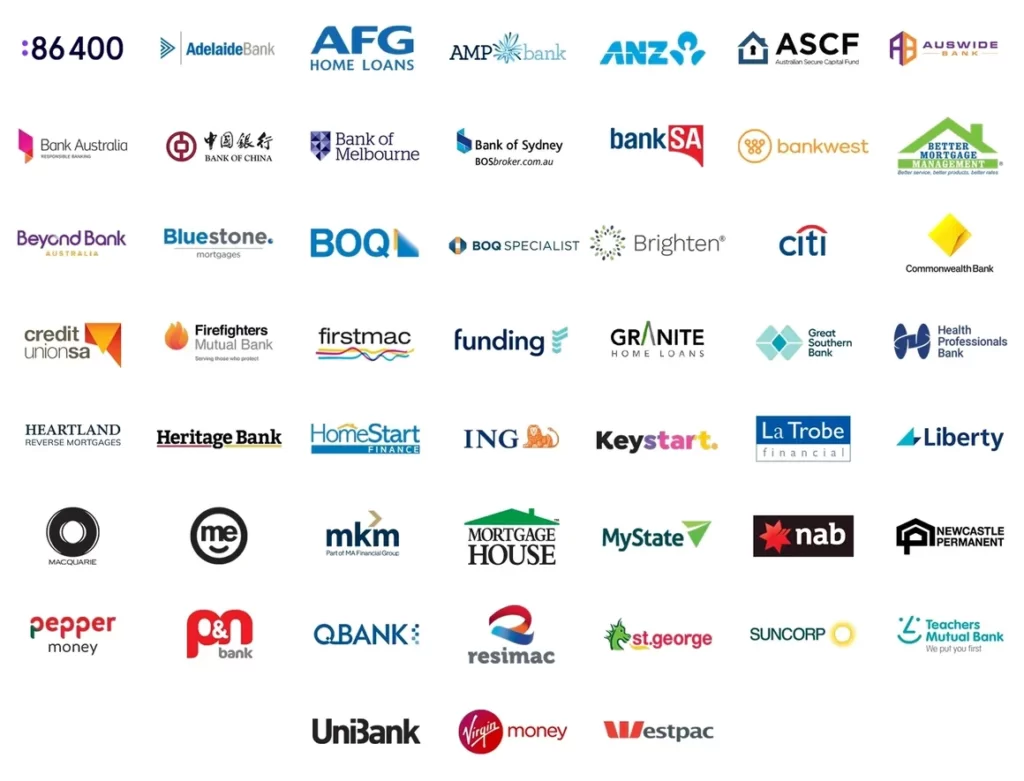Investment Loans
An investment loan, often used in real estate, is a financial tool that allows individuals to acquire properties for the purpose of generating rental income or capital appreciation.
Am I Eligible for a Loan?
Qualifying for an investment loan can be intricate, particularly if you intend to leverage negative gearing benefits to demonstrate your loan affordability. Investment loans inherently carry a higher risk compared to standard home loans. Consequently, you must be in a strong financial position to meet the approval criteria. The fundamental eligibility requirements include:- Holding 5% to 10% in genuine savings.
- When borrowing more than 90%, some lenders prefer to see equity in other properties (indicating this isn’t your first investment property).
- A positive credit history.
- An above-average credit score.
- Consistent and stable employment.

Exploring Lender Options for Investors
From the perspective of Australian banks, investors pursuing larger loans are often valued clients. However, it’s crucial to understand that investment loans entail greater risks for these institutions.
Imagine you have both a home loan secured by your primary residence and an investment loan tied to an investment property. In times of financial hardship, you may wonder which loan to prioritize.
If the bank must sell your investment property to recover debts, complications can arise, including tenant disputes or property damage. Consequently, banks maintain lower Loan-to-Value Ratios (LVRs) and stringent lending standards.
The key for investors is to align with a bank that actively supports investment endeavors, rather than one with a cautious stance. It’s important to recognize that we have insights into identifying such investor-friendly banks.
In Australia, various banks and non-bank lenders consider investment loans with LVRs up to 95%. Each lender maintains distinct criteria, and our recommendations are tailored to your unique financial profile and borrowing capacity. This personalized approach ensures we connect you with the most suitable lender for your investment goals.
Enhance Your Borrowing Capacity
Boosting your borrowing potential can significantly impact your investment strategy. Follow these straightforward tips:
Choose Lenders with Investor-Friendly Criteria: Align with lenders who have flexible criteria catering to investors, ensuring your application stands a better chance.
Trim Credit Card Limits: Reducing your credit card limits can free up available credit and enhance your serviceability.
Joint Applications: Consider applying for loans jointly with your spouse to maximize the utilization of your combined income, increasing your borrowing capacity.
Opt for Positively Geared Properties: Investing in positively geared properties, where rental income exceeds expenses, can positively influence your serviceability.
Consider Fixed Rates: Exploring fixed-rate options for three to five years can stabilize your repayments and improve your borrowing power.
Each bank evaluates investment property loans differently. Several key factors can either expand or limit your borrowing capacity:
Rental Income: While most banks consider only 80% of rental income, some may use the full 100% for assessment.
Other Income: Assessment of income varies among banks, especially for overtime, bonuses, commissions, allowances, trust distributions, dividends, and self-employed income.
Assessment Rate: Many banks don’t assess your loan capacity based on the actual rate you’re paying. They add a buffer, typically up to 2%, to ensure affordability in the event of rate hikes. However, certain lenders either don’t apply this buffer or use the actual rate for loans fixed for over three years.
Existing Debts: Some banks assess existing debt repayments as principal and interest, even for interest-only loans. This can be challenging for investors with substantial portfolios.
Negative Gearing: Not all lenders consider the benefits of negative gearing in their serviceability calculations. If your portfolio isn’t positively geared, seek lenders who incorporate these benefits.
We specialize in connecting borrowers with lenders who can accommodate their specific financial situations. It’s essential to remember that responsible borrowing is paramount. We won’t assist you in obtaining an investment loan if we believe it could lead to financial strain. If you’re eager to explore your borrowing potential across different lenders, please contact us at 1300 401 847 or fill out our online inquiry form. One of our mortgage brokers will reach out to discuss your tailored options.
Ready to Apply for an Investment Loan?
The right investment home loan depends on your unique financial goals, and numerous borrowing options and strategies are available. You can discuss these possibilities with our expert mortgage brokers by calling 1300 401 847 or filling out our online inquiry form to explore mortgages from multiple lenders. Before pursuing an investment, we recommend seeking independent financial advice to make informed decisions.
Investment Loan Approval
Obtaining approval for an investment loan may seem challenging, but it’s far from impossible. Key considerations include:
- Deposit Options: If you aim to borrow over 90% of a property’s value, many lenders accept equity in your home as an alternative deposit.
- Avoid Common Mistakes: Minimizing common investment errors can set you on the right path for your investment journey.
- Borrowing Power: Maximizing your borrowing capacity is essential for investors. Certain lenders offer more generous borrowing power calculations.
- Multi-Lender Strategy: If you own multiple investment properties, consider a multi-lender approach. This involves refinancing existing loans with the most cost-effective lender and then applying for new properties with the lender offering the highest borrowing limits, ultimately minimizing interest expenses.
Our team of mortgage experts possesses extensive experience working with various lenders, providing insights into their policies. We can assist in devising a plan to increase your chances of securing an investment loan.
Acceptable Property Types
Lenders typically have specific criteria for acceptable property types. In general, your property should meet the following requirements:
- Be a standard unit, house, townhouse, or land with construction.
- Offer a living area greater than 50m².
- Be in good condition.
- Be situated in a high-demand location (major city or town with over 10,000 residents). For properties not meeting these criteria, please review our property types page for insights into borrowing for alternative investment property types.
Variety of Loan Types
Investment loans come in all types, including:
- Professional packages
- Basic loans
- Lines of credit
- Fixed rates
- Discounts and loan features Notably, you can access investment professional package and investment basic loan discounts. Additionally, investment loans provide similar features to other loans, such as interest-only options, fixed rates, lines of credit, 100% offset accounts, redraw facilities, and opportunities for extra repayments. Our experienced brokers can help identify the most suitable investment loan for your unique situation. Reach out to us at 1300 889 743 or submit an online inquiry to get started today.
Loan Utility
Investment loans are versatile and can be used for various investment purposes, provided they are within legal bounds. You can invest in property, shares, managed funds, options, or business ventures with an investment loan.
Is This Loan for You?
An investment loan is designed for anyone interested in borrowing for investment purposes. Most investors typically have professional backgrounds with substantial taxable incomes. Borrowing 95% for an investment property is best suited for individuals in strong financial positions who possess knowledge of property investment or have experience building a property portfolio. It’s generally not advisable for those with a poor credit history, as investment loans can be costly and may not yield a substantial return on investment.
Maximum Interest-Only Term
The maximum interest-only term available in Australia is 15 years. However, most lenders typically allow a 5-year interest-only period, with select lenders offering 10 years, and only a couple offering a 15-year interest-only option. Many investors opt for interest-only investment loans to alleviate monthly cash flow constraints and allocate funds toward new investments or their lifestyle.
95% Investment Loans
Some lenders are willing to provide investment loans allowing you to borrow 95% of the purchase price of your new investment property. This includes covering the cost of mortgage insurance. Such loans are considered high-risk by banks, so applicants should have a strong financial position for approval. Certain lenders may require principal and interest repayments until the loan balance falls below 90% of the property value. Most lenders also mandate having 5% genuine savings, with some requiring 20% equity in another property. To explore approval for a 95% investment mortgage, contact us at 1300 401 847 or submit an online inquiry, and our mortgage brokers will guide you through the process.
90% Investment Loans
Borrowing 90% of the value of your investment property is considered less risky than a 95% LVR mortgage. Consequently, it’s easier to secure approval, and most lenders permit interest-only repayments. The cost of lenders mortgage insurance (LMI) is also lower, with more lenders open to exceptions from their standard credit criteria.
Extending LMI Coverage to 97%
Certain mortgage insurers have adjusted their policies, capping investor loans at 95%, which includes LMI. Consequently, this change adds approximately 2% to the necessary deposit. For instance, if you were purchasing a $500,000 investment property, this alteration would mean you require an extra $10,000 in savings. Nonetheless, a selection of lenders has established arrangements with their mortgage insurers, allowing them to continue offering loans of up up to 97%, which includes the LMI premium.
How to Secure a 100% Investment Property Loan
Achieving a 100% investment property loan is possible through two main avenues:
- Investment Guarantor Loan: If your parents are willing to provide a guarantee for your loan using their property as collateral, you can access up to 105% of the purchase price without paying LMI. More details on this option are available on our family guarantee page.
- Using Another Property as Security: If you already own another property, you can leverage the equity in that property as a deposit for your next investment. This allows you to borrow 100% or even 105% of the purchase price.
Should you lack a guarantor or equity in another property, the maximum loan-to-value ratio (LVR) you can secure is 95% of the property’s value.
For further assistance in obtaining approval for a 100% investment mortgage, please don’t hesitate to reach out to us at 1300 401 847 or make an online inquiry. One of our experienced mortgage brokers will be happy to assist you!
Explaining Negative Gearing
Negative gearing is a financial strategy in which you borrow funds to invest in an asset, typically a property, and at the end of the financial year, your interest and operational costs exceed the income generated from your investment, resulting in a financial loss.
This approach is used to leverage the potential benefits of entering the investment market early, with the goal of increasing your investment income over time to cover expenses. Meanwhile, you can generally claim this net loss as a tax deduction against your other income. This strategy tends to work well for investors with higher taxable incomes because the capital gains and tax advantages often outweigh the holding costs. However, if you have a lower income, alternative investment strategies may be more suitable. Always consult an independent financial advisor when determining your investment approach.
Advantages of Property Investment
Investing in property offers several advantages, including financial security and the potential for higher returns compared to other investment avenues. Some notable benefits are as follows:
- Secure Investment: Unlike the volatile nature of the stock market, property investments tend to provide more stable and predictable returns.
- Consistent Returns: Rental yields from investment properties can yield a continuous income stream. If these yields exceed your mortgage repayments, your property may essentially pay for itself, with potential surplus funds for property-related costs.
- Growth Potential: Property prices, particularly in desirable locations, can experience substantial appreciation, making it a valuable long-term investment. On average, Australian property values tend to outpace inflation by around 2%.
- Tax Deductions: Many property-related expenses, such as maintenance, rates, and insurance, may be eligible for tax deductions, reducing your overall tax liability.
- Asset Base: Owning investment property provides a valuable asset base that can be leveraged to secure additional financing for further investments, thus expanding your personal wealth.
- Enhanced Borrowing Capacity: When purchasing an investment property, you may be eligible to borrow up to 90% or 95% of the property’s value, albeit with the potential cost of lender’s mortgage insurance (LMI), which can often be included in the borrowed amount.
Challenges of Property Investment
While property investment offers various advantages, it also comes with certain drawbacks that you should consider before making investment decisions. These include:
High Costs: The upfront expenses associated with purchasing a property can be substantial. Additionally, there are ongoing costs such as maintenance, rates, and taxes that can significantly impact your finances.
Lack of Liquidity: Unlike shares, selling a property can be a time-consuming process. In situations where a quick sale is necessary, the value of the property can be affected. Properties often remain on the market for extended periods, especially during financial crises, which may delay your financial gains.
Vacancy Gaps: Periods of vacancy can occur, leaving you responsible for mortgage repayments without rental income. This situation may arise when your rental income doesn’t cover your mortgage costs, requiring you to cover the difference yourself.
Risk: Although property investment is generally considered less risky than the stock market, a significant drop in property value can put you in a precarious financial position, especially if a substantial portion of your assets is tied up in the property.
Taxes and Additional Costs: Property ownership involves various taxes, rates, and additional expenses, which can impact your investment’s profitability. It’s crucial to understand these costs and their implications.
Understanding Property Investment Costs
Before embarking on a property investment journey, it’s essential to comprehend the associated costs of property ownership. Several fees and charges are involved, including:
Valuations: Property valuations are crucial to determine market worth and rental income potential. However, they can be costly, as are property inspections and research on prospective purchases.
Stamp Duty: This expense can amount to a significant portion of the property price, often around 6%. Stamp duty rates vary from state to state.
Legal Fees and Conveyancing Costs: These are typically payable when buying property but may sometimes be waived for investors.
Property Title Transfer: The transfer and registration of property in your name also incur costs.
Ongoing expenses associated with property ownership include:
Rates: Owning and leasing a residential property may require you to cover council rates and other taxes such as water bills.
Maintenance Costs: You are responsible for property repairs, replacements, and regular services like pest control and plumbing. While maintenance is tax-deductible, aesthetic improvements like painting or new fittings may not offer the same tax benefits.
Levies: If you invest in strata-titled or apartment properties, you may need to pay fees to the body corporate, which uses these funds for building repairs and maintenance.
Insurance: Property insurance is necessary to safeguard against damage to the property, its fixtures, and contents.
Interest: High-interest rates on loans add to your monthly expenses, and it’s important to consider the impact of interest when determining the property’s profitability.
Agent Fees: If you engage a property manager, you will incur additional charges for their services.
Before investing, establish a comprehensive plan and budget, and consult with a financial planner to ensure you’re well-prepared for the costs and commitments of property ownership.
Why Choose Property Investment?
Interested in acquiring an asset for passive income and tax advantages? Investment properties are the answer! Property investments offer high leverage, maximizing returns with minimal initial funds. Tax benefits, including deductible loan interest, lower your tax bill, reducing property holding costs.
Additionally, many first-time homebuyers opt for investment properties, benefiting from higher borrowing capacity. This allows them to buy their desired home, rent it out, and move in later.
Exploring Investment Opportunities
You can leverage existing properties to invest in assets like shares, businesses, and bonds, all at a lower cost than margin loans. Using your property as collateral helps you avoid margin calls and save on interest.
Contact us at 1300 401 847 or inquire online to find lenders for your investment loan. We’re here to help you navigate the mortgage application process while considering the risks associated with your investment choices!
Related Topics
Why Choose Clear Pacific Capital?
Our Services
Our Approach to Finding the Ideal Solution for You
We begin by gaining a comprehensive understanding of your current circumstances and your long-term objectives. Our process is designed to provide you with a tailored recommendation, and it's as simple as following these few steps:
1
Start by filling out our free assessment form or giving us a call.
2
Our team will carefully evaluate your unique financial situation.
3
We thoroughly examine the various options available through our network of trusted lenders.
4
The end result? We'll pinpoint the most fitting and advantageous home loan offers for you.
Clients Love
Testimonial
Highly recommended. Irfan is an incredibly knowledgeable and professional broker. Irfan was able to help us every step of the way in our journey to buying our first home.






